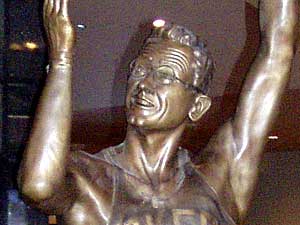|
Audio
Photos
Resources
|
June 2, 2005
 |
| A bronze statue of George Mikan stands in the lobby of the Target Center in Minneapolis. (MPR Photo/Ted Clement) |
Scottsdale, Ariz. — At 6-foot-10-inches, George Mikan often towered over other players in the NBA. But his size alone isn't what made him a great player, says Sid Hartman. As a sportswriter in the '50s Hartman worked so closely with the Lakers, he was considered the team's unofficial general manager.
"He came in the game when there weren't a lot of other big men. There was one other great big man, who came out of Oklahoma, name of Bob Curlin. Otherwise, there was nobody in his class," according to Hartman.
Unlike other big men, Mikan could jump and shoot. He averaged around 23 points per game in seven seasons with the Minneapolis Lakers. In the 1948-49 season, Mikan was named the league's Most Valuable Player. Opposing teams tried to slow Mikan down by playing rough with him. Mikan referred to the physical nature of the NBA in a 2001 interview with Minnesota Public Radio.
"I broke my arm. I broke my leg. I had I can't tell you how many stitches I had in my face," he said.
Mikan sustained 10 broken bones during his career. His injuries eventually forced him to retire in 1956. But when opposing players couldn't stop him, a few rule changes were made to level the playing field. Mikan described those changes in a 1991 interview.
"We had the 6-foot lane underneath the basket and they didn't like me that close to the basket, so they moved it out to 10 feet, and then 12 feet and now it's at 14. That's the zone area where they call the three-second rule. Then they eliminated the deflecting the ball away from the basket, goaltending," he said.
College basketball's rules on goaltending were also inspired by Mikan's ability to swat a ball away from the rim of a basket. Mikan didn't play high school basketball, but he was standout at DePaul University, located in his native state of Illinois. He was named College Player of the Year twice and an All-American three times. And Mikan led DePaul to the NIT title in 1945. Mikan says growing up he used to play basketball in the backyard with his brothers. But it wasn't until he got to college when coach Ray Meyer helped him become a more agile athlete, even coaxing him into a ballet class.
"He would get me to dance with all the short women in the class. We'd have dances and he'd have me with the smaller girls so that I wouldn't obliterate them and step on their toes," Mikan said.
Some say Mikan's most valuable contribution on the court was his ability to make the players around him better. Mikan was the focal point of the team's offense. He served as the pivot player -- either passing the ball to the other faster players driving toward the basket or Mikan would put the ball through the hoop with hook shot.
In addition to all his other honors, in 1996, Mikan was recognized by the NBA as one of the 50 greatest players in NBA history. Mikan says his success came about by working for it.
"I wanted to be good. I wanted to get everything out of it that I could and I made up my mind from the first team on that I'll try as hard as I can and play so I have no regrets, and I don't have any regrets that I could've, should've played better," he said.
Mikan died Wednesday night. For the last several years, Mikan had been suffering from a list of ailments including diabetes and kidney failure. In 2000 one of his legs was amputated. Though hobbled by infirmities, Mikan still worked to improve the game of basketball. He was an advocate for larger pensions for retired players. Mikan's son says his father received a monthly pension check for $1,700.
Mikan is survived by his wife of 58 years, six children and numerous grandchildren and great grandchildren.




